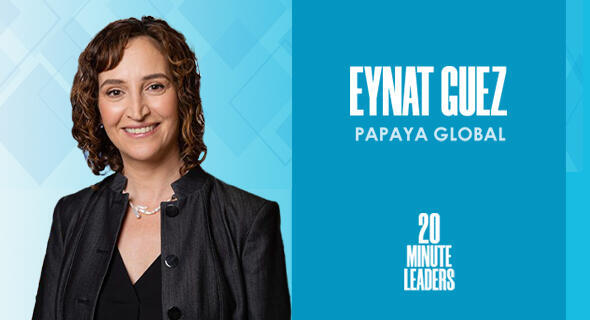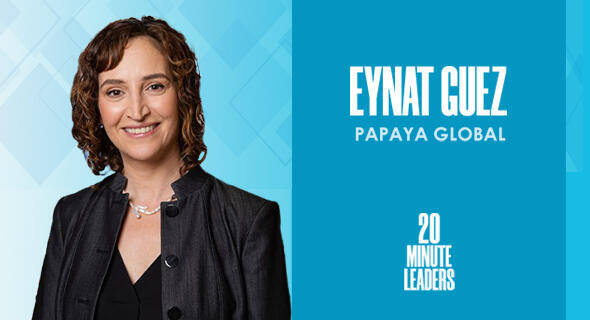
20-Minute Leaders
“The main challenge was to understand if the knowledge that I have is solid enough to transform into a scalable product.”
Now that Papaya Global is an established company, co-founder and CEO Eynat Guez sees that they have an opportunity to design the global payroll processes of the future and create a new reality for companies and employees.
Now that Papaya Global is an established company, co-founder and CEO Eynat Guez sees that they have an opportunity to design the global payroll processes of the future and create a new reality for companies and employees. She envisions employers giving workers more control over when they get paid and providing more benefits around financial matters. Guez says small actions on these issues can create big changes over time. She expects governments to adapt to the shift to remote work with easier tax requirements as well. Right now, Papaya helps to bridge the gap between different countries’ requirements and their clients’ payroll needs. She shares that payroll is a very local process, and that leads to difficulties for global companies. Guez brought her twenty years of experience with the global workforce to the solutions at Papaya after a process of discovering that her knowledge could be transformed into a product.
As the world becomes more globalized, compliance still has a question mark. You're really sitting on cutting-edge advancements of enabling the world to understand and to deal with this complexity. Take me back six years. Where were you in your own life and your thinking process that led to the creation of Papaya Global?
The whole creation of Papaya Global is boring in one sense, and it's very unusual if you're looking at other founder stories. I've been dealing with the global workforce for 20 years now. After my military service, I worked with a company doing mega-projects in Africa. We did massive relocations at that time to the continent. At the end of 2008, beginning of 2009, I decided that I wanted to start my own venture. I established a business called Relocation Source providing corporate relocation services to and from Israel. A few years later, I was seeing the shift of my clients to China. I decided that I need to spend some time there. I started my second company called Expert Source, helping clients to start a global business in China.
A few years later, I thought, "What do I want to do when I'm going to grow old?" I think the main challenge for me was to understand if the knowledge that I have is actually interesting enough or is solid enough to transform it into a scalable product. When I was starting my own research, I realized that at the time a lot of HR payroll companies in the US started to grow very quickly. I said, "If the need is there in the US, it's definitely a much bigger problem globally when you are leaving your main country." This is where we started with the idea of Papaya and really the incubation of this.
I think that the first thing that I heard during the first year is, "Oh, this is such a boring topic." I think that the word "compliance" really got a very different perspective during the five or six years that we are in business. In reality, we are all paying taxes. It's not going to change, and we all need to remain compliant.
How did your thesis change over time? Were there different milestones that really changed your thesis regarding what companies need and want in terms of their global payroll management?
I think that many things changed. At the beginning, we thought that the best use case for Papaya will be small to medium businesses where you don't have the infrastructures in place. Currently, as the company is bigger and much more global, this is where the scaling and eventually the pain is becoming much bigger. Payroll is a huge bottleneck, and it's a recurring process. Everyone needs to be paid correctly. You need to collect tons of data. Every single country changes things that you are not aware of. I think this is the main thing that has changed.
The second thing that has changed is the understanding that our job actually does not end with the data processes of the payroll and processing the payments themselves. This is a huge pain that doesn't have a good solution. The majority of the problems in payroll come from the fact that it's a very local process. Companies are trying to act global, but in reality you need to become local in every single stage. There is this huge gap between compliance and regulation and anti-money laundering processes and what you need to do in order to be a local business in order to make it. Those are the gaps that we are trying to bridge.
I co-founded Papaya in 2016, and about 2017 or 2018, the new GDPR regulation came into place. Now you have another challenge because the payroll data is the most sensitive data in the organization. In reality, if you're looking at the payroll evaluation in terms of countries, in the past five years, the process has become massively more complex. There is also a huge gap between requirements, market requirements and legislation, and the need of the clients, the end users. This is where we are trying to bridge.
One of the questions that we ask ourselves is "Where is it going to land? What type of technology do we need to eventually bring to the world in order to make it very feasible?" I think that the challenges that we see in technology are much bigger than five years ago. We understand that the biggest way is the ability to really trust payroll as a full financial service and not just an HR service.
You have the company side and you have the people that are getting onboarded. They've also seen a shift in the last few years. How did you experience that shift?
I currently understand that payroll needs to be reinvented. Because in reality, what happened in COVID is that everybody started kind of shifting themselves. Some countries created amazing tax benefits and made it very easy for digital nomads just to settle in. But in reality, those people moved, but their payroll stayed behind. This is a reality that I think that the governments today don't understand that they need to change. We all need to be digital nomads and our income needs to be global. Then if you have kind of a global account, you can split it between countries and make it very, very easy to understand. I think that the whole rethinking about payroll on a global transformation is something that the world really needs to do. I think that in the next two or three years, you're going to see countries that are the big winners because they have a very good tax environment.
The second thing, this is more about the personnel, is the fact that I think that we have a very big opportunity to transform payroll to be the biggest benefit in the organization. The biggest commitment that you're going to take is probably a mortgage to buy a house. What you're doing at this point of time, you are taking the data from the company, you are going by yourself to banks, and you are asking them to finance you. Let's transform it into a benefit. If I know that I have a great buying power of my employees, I bring the banks to eventually bring them the best benefits.
The same with flexible pay. Who said that it makes sense for you to be paid every two weeks, every month? In some way, you are always financing your company. Companies could say, "These are your funds. We are just keeping it because you already earned this. We will help you to utilize it better. We will bring you better benefits. But you take ownership. You take control. I am not the one that dictates that on the first of every month you are going to get paid." I think that this is the transformation that needs to happen to create something that meets your lifestyle and your specific needs.
Do you have a responsibility here to act on this vision? It's a different mindset than when you're just starting out a company.
When you are starting a company, you are in survival mode. You need to assure that you can go beyond tomorrow and the day after. Now, we have the rare opportunity to design reality and to start designing the processes. I think that, in reality, this can create tons of transformation in many, many important things between countries and improve people's lives. So I'm involved in some initiatives. I don't think that we can change the whole world, but I think that it starts with some small actions that are growing over time.
Michael Matias, Forbes 30 Under 30, is the author of Age is Only an Int: Lessons I Learned as a Young Entrepreneur. He studies Artificial Intelligence at Stanford University, is a Venture Partner at J-Ventures and was an engineer at Hippo Insurance. Matias previously served as an officer in the 8200 unit. 20MinuteLeaders is a tech entrepreneurship interview series featuring one-on-one interviews with fascinating founders, innovators and thought leaders sharing their journeys and experiences.
Contributing editors: Michael Matias, Megan Ryan














